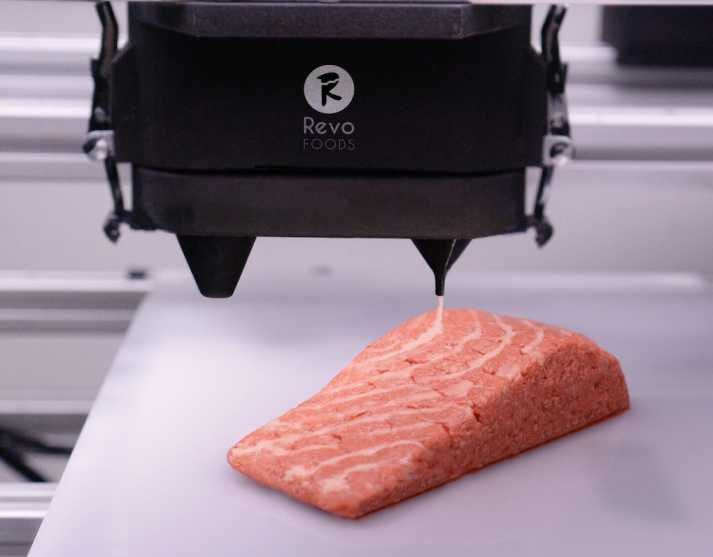Cultivated Meat Can Be Halal, Biotech to Fight Malnutrition, and Ego-Driven Founders
Also: The "first" commercial-scale precision fermentation plant in the US.
Hey!
Before we jump into this week's edition, I wanted to quickly address a recent email that you may have received from me (unintentionally). Some of you might have received an automated, pre-selected upsell email from Substack offering a 20% discount on a one-year subscription to the newsletter.
I want to clarify that this email was not my intention, as there is currently no benefit to switching to a paid subscription (it's basically a donation). Also, I am very conscious of not sending more than one email per week because I understand how spammy inboxes can get.
I would like to assure you that I am reviewing the newsletter settings to prevent such occurrences in the future. Thank you for your understanding. I appreciate your continued support! 🙏🏾
BIO BUZZ
🇿🇦 Newform Foods launches the Plenty Foundation to address food insecurity and malnutrition in Africa through biotechnology
The nonprofit foundation plans to focus on plant-based proteins and collaborate with Newform Foods to improve the taste and nutrition of plant-based foods using cultivated proteins.
The Plenty Foundation's strategy involves a combination of philanthropy, commercial R&D, and market partnerships to reduce undernourishment rates.
The founder described the foundation as a movement striving to revolutionise food and nutrition in Africa by combining modern technology with a deep understanding of local needs to create sustainable, impactful change.
Read full article - vegconomist
🇮🇱 BioBetter opened its first food-grade pilot facility to produce growth factors for the cultivated meat industry through molecular farming
The Israeli biotech startup aims to reduce the production cost of growth factors, including insulin, to $1 per gram, a 100-fold reduction from current rates.
BioBetter transforms tobacco plants into bioreactors to manufacture growth factors. These genetically modified plants are cultivated in a large-scale, net-house cultivation system to ensure environmental safety and operational efficiency.
The company claims that it has reached commercial-scale cultivation, with the capacity to process 100 kg of tobacco plants each day at the new facility, with the goal of processing five tons by 2025.
Read full article - vegconomist
🏭 LiDestri Foods and Fermentum established the "first" commercial-scale precision fermentation plant in the US to support industrial biotech
LiDestri Foods, the largest private label and food contract manufacturer in the US, is providing $8.5 million in financing for leasing and construction. Fermentum, a leading fermentation capacity expert, will operate the facility with 510,000 L of precision fermentation capacity.
The facility is operational and available immediately. It is equipped with the necessary machinery, including tank capacities ranging from 400 L, 20,000 L, and 70,000 L, for scaling ingredients from the lab to pilot and commercial-scale fermentation.
The new capacity aims to expand the precision fermentation industry, producing animal-free proteins with a smaller carbon footprint to combat climate change.
Read full article - vegconomist
🇺🇸 Upside Foods announces new commercial-scale manufacturing plant capable of producing 30 million pounds of cultivated meat per year
The large-scale manufacturing plant near Chicago is focusing on producing ground cell-cultured chicken products with the potential to eventually produce 30 million pounds of cultivated meat and seafood products per year and contains cultivators with capacities of up to 100,000 L.
The new facility is one of the world's largest and most advanced of its kind, expanding the company's capabilities beyond its California-based Engineering, Production and Innovation Center (EPIC).
Upside Foods plans to diversify its product range beyond ground chicken into other animal-based foods and whole-textured formats, with the long-term goal of achieving price parity with conventionally produced meat.
Read full article - Green Queen
🇪🇸 Libre Foods plans to launch the EU's first mycelium-based chicken breast
The product, Libre Chicken, has fewer calories and more dietary fibre than traditional and plant-based chicken, with a goal to match conventional chicken's protein content.
The Spanish company aims for price parity with traditional chicken and is focused on scaling and streamlining operations. The short ingredient list of Libre Foods is in line with consumer preferences.
The brand has received positive feedback from existing customers and plans to fundraise for further development, building on previous investments, including $2.5M in April 2022.
Read full article - Green Queen
🍣 Revo Foods is launching a 3D-printed, mycoprotein-based, whole-cut salmon filet, the first 3D-printed meat alternative to hit supermarkets
The salmon is made from mycoprotein-based material developed in collaboration with Mycorena and uses innovative extrusion technology to replicate the texture and flavour of conventional fish.
This January, the two startups announced their partnership as part of a €1.5M grant from the EU funding programme. Using the Promyc protein base from Mycorena, they developed "The Fillet - Inspired by Salmon," a mycoprotein base designed for 3D printing.
Revo Foods' patented 3D-MassFormer tech creates ultra-realistic salmon filets by blending fats into a protein matrix, mimicking traditional fish texture, and enabling continuous mass production of 3D-printed seafood.
Read full article - Green Queen
🐮 Steakholder Foods files provisional patent for immortal bovine cell lines to create a stable and renewable source for generating tissues
The company previously worked on cultivating pork products using stem cells and views this new patent as a significant step towards large-scale cultivated meat production, claiming it paves the way for scale, repeatability, and growth.
The patent introduces immortal cell lines capable of producing various tissues, including muscle and fat, and enhancing bovine cell growth, resulting in immortalization and increased biomass production with reduced division time.
The company described the development as a "paradigm shift" in food production. It has the potential to provide a sustainable, slaughter-free meat supply for the future, with one cell theoretically capable of producing an enormous amount of meat.
Read full article - vegconomist
🧪 3D Bio-Tissues is expanding to Hong Kong to introduce its cell-boosting media supplement to the Chinese cultivated meat market
The UK-based company plans to target the Chinese biotech industry, hire R&D experts and sales specialists, build distribution networks, and establish manufacturing partners in China.
The expansion is backed by biotech investor BSF Enterprise, which raised £2.9 million to support 3DBT's progress and production capabilities.
3DBT, known for its cultivated meat prototypes using City-Mix, is also planning to launch a subsidiary focused on mass production processes for cultivated meat to tap into China's growing market for such products.
Read full article - vegconomist
🇩🇰 MATR Foods is using fungal fermentation and upcycled vegetables to make meat alternatives
The Danish startup uses organic ingredients like oats, split peas, lupin, beetroot, and potatoes. It adds natural fungi spores to ferment these ingredients, creating low-calorie, high-fibre products with no additives.
MATR offers plant-based steak, mince, and customizable blocks. Their products have launched in the UK, Denmark, and Germany, including collaborations with Sticks N'Sushi and Gasoline Grill.
MATR secured €1.3 million in funding and plans to expand production and launch in retail stores next year due to high demand.
Read full article - vegconomist
🍔 "We kind of insulted the very people we wanted to have try our product." - Impossible Foods CEO on plant-based meat marketing
CEO Peter McGuinness acknowledges that the company had its challenges but is satisfied with the overall performance. Particularly in the retail sector, Impossible continues to experience high single-digit to low double-digit growth and maintains a strong repeat rate of 50%.
The company also has long-standing partnerships with key foodservice chains, including White Castle, Burger King, and Starbucks. However, he recognises the need to increase awareness, as only 15% of households are aware of Impossible's products.
On marketing meat alternatives: “I think the category was not launched in the best possible way. It was launched against the cattle industry...We kind of insulted the very people we wanted to have try our product… You don’t vilify people, you don’t judge people; you invite people to try your products.”
Read full article and listen to the interview - AgFunder
MACRO STUFF
🕌 Cultivated meat can be considered halal if it meets specific criteria, according to leading Shariah scholars

This certification is essential for making cultured meat acceptable to the 25% of the world's population that follows halal dietary guidelines. The Halal meat market is estimated to grow by 7% annually to reach $375B in 2031.
To be halal-certified, cultivated meat must meet several criteria, including:
using cell lines from permissible animals (e.g., chicken or cow)
following Islamic slaughter methods for the source animal
using permissible nutrients for cell growth (excluding forbidden substances like blood or alcohol)
ensuring the safety of the final product as confirmed by food regulatory agencies.
Some types of cultivated meat, such as pork and products derived from controversial sources like fetal bovine serum, can’t be considered halal as they go against Islamic dietary restrictions.
Read full article - Green Queen
🍽 Swapping out 50% of your meat and dairy for plant-based cuts emissions by 31% and halts destruction of forests and natural land
Transitioning to vegan meat and dairy, along with reforesting land formerly used for livestock, could double climate benefits, cut the decline of ecosystems in half, and significantly reduce food system emissions by 2050.
If 50% of leading animal products like pork, chicken, beef, and milk are substituted with plant-based alternatives, it would decrease land used for livestock by 12% and reduce water use by 10% from a 2020 baseline.
Additionally, these changes could lead to food security benefits, including a 3.6% reduction in global undernourishment, translating to 31 million fewer undernourished people by 2050.
Read full article - Green Queen
🌱 Plant-based is dead, long live plant-based
Many companies focused on replicating animal-based products but overlooked consumer motivations. Most are motivated by flavour, health, or novelty, not strict diets. Recognisable ingredients are gaining importance.
The "growth at all costs" approach is fading as macroeconomic challenges arise. Companies must prioritise profitability, streamline operations, and collaborate to secure shelf space and meet the demands of foodservice.
Collaboration is vital for cost reduction, marketing efficiency, and innovation. Some brands may not survive, and consolidation is likely. Shared ingredient sourcing, marketing, and R&D can benefit the industry.
Read full article - Green Queen
New here? Devour the free subscription and join a list of founders, investors, and biotech enthusiasts leading the food revolution!
BIO BUCKS
💰 EIT Food is providing €1.2 million in additional funding to support companies to develop innovative products aimed at reducing the cost of producing cultivated meat
The primary focus of this funding is to lower the cost of cell culture media, a significant barrier in the commercialization of cultivated meat.
The goal is to facilitate market testing and commercialization efforts for these innovative products, with the aim of making cultivated meat more accessible to European consumers.
Cultivated meat has the potential to significantly reduce greenhouse gas emissions compared to conventional meat production, and the focus is on using more cost-effective "food grade" cell culture media for higher cell yields.
“The cost of cell-culture media is a significant barrier to scaling cultivated meat, and we hope that reducing this will bring us one step closer to seeing these innovations on the market – and to achieving a more healthy, sustainable food system.” - Dr. Adam M. Adamek, director of innovation at EIT Food
Read full article - GFI Europe
🇰🇷 HN Novatech secured $4M to develop and commercialise its seaweed-extracted heme for plant-based meat applications
The South Korean food ingredient company, which has filed 19 patents, claims to be the first to extract heme-like molecules from seaweed. The ingredient enables the creation of meat alternatives like burger patties, bulgogi, and sausages.
The seaweed-extracted heme ingredient, ACOM-S, provides an "accurate meat" flavour. It’s available in four flavours: beef, pork, chicken, and lamb, with a focus on clean-label alternatives.
HN Novatech is expanding its operations in Asia, particularly Singapore, and plans to establish a food technology processing facility in Korea to become a global leader in innovative food ingredients.
Read full article - vegconomist
🏴 OCEANIUM raised $2.6M to scale its biorefinery technology and accelerate the commercialisation of seaweed-derived products
The Scottish seaweed cultivation and processing company's products include OCEAN HEALTH Fiber and OCEAN HEALTH protein for food applications. OCEAN HEALTH Fiber has received GRAS status in the US and regulatory approval in the UK and the EU.
The company's biorefinery model is seen as a solution for food security, stable supply chains, and addressing climate change through seaweed production.
Following a 75-tonne processing run this year, the company attracted a list of B2B customers eager to introduce innovative products. OCEANIUM has also stated plans to hire a managing director in light of its growth and international expansion.
Read full article - vegconomist
🍄 The global mycelium market is projected to be valued $4.76B by 2028, at a CAGR of 9.39%
The global mycelium market was valued at $2.85 billion in 2022. Mycelium-based products are gaining traction due to a shift in consumer preferences towards plant-based meat and veganism, leading to increased R&D efforts.
The market's growth is fueled by the demand for sustainable materials and their role in the circular economy, highlighting the environmental benefits of mycelium-based products.
There are significant opportunities for investment in mycelium R&D, especially with the global focus on achieving net-zero emissions and the growing popularity of sustainable products, particularly in the F&B industry.
Read full article - vegconomist
SOCIAL FEAST
😬 The biggest threat to the alt protein industry isn't lack of innovation, it's the unchecked egos of founders
The industry's funding is drying up, impacting even companies with substantial past fundraising. Ego-driven actions include founders taking large sums during fundraising, refusing to step down when unfit, and sabotaging new leadership.
Investors allowed and condoned such behaviour for years. These actions, while not catastrophic individually, collectively endanger the industry during challenging times.
Some founders are doing great work, but the success of all is tied to addressing these issues in the industry's toughest 18 months ahead.
Read post on LinkedIn - Jennifer Stojkovic
🤔 Can Italy protect its culinary heritage while embracing the future of food production?
The Italian Senate has proposed a bill to ban cultivated meat, citing cultural and national interests. This raises questions about the impact of such a law and whether a culture can evolve while preserving its identity.
Two examples highlight how Italian food has evolved over time. Bluefin tuna overfishing led to the end of traditional practises, while tomatoes, originally from South America, became a staple in Italian cuisine.
Protecting Italian food heritage could involve embracing biotechnology for sustainable alternatives, like cultured bluefin tuna. Italy has an opportunity to protect its heritage by reconsidering the ban on cultivated meat.
Read post on LinkedIn - Nicholas Genovese, PhD
🧐 6 ways of finding alt protein business ideas
The Good Food Institute (GFI) offers insights based on industry expertise and identifies white spaces in the field.
Connect with industry experts and potential co-founders on LinkedIn to discover existing challenges and opportunities.
Analyse what venture capitalists and incubators are funding or not funding to spot gaps in the market.
Read all six ways on LinkedIn - Oliver Fuss
Got a taste for this newsletter? Dish it out to your friends!👇🏾
EAR FOOD
🎙 Plant-Based World Expo, La Vie’s plant-based ham, and COP28 to serve mostly plant-based food
Show: Green Queen Alt Protein Weekly
Host: Sonalie Figueiras, Steve Molino
This year’s Plant-Based World Expo saw a notable decrease in hype and extravagant displays, signalling a more grounded approach in the industry. Most of the expo’s discussions revolved around profitability, consumer understanding, and market positioning. Interestingly, some mycelium/mushroom-based companies were present but didn't overly emphasise their unique attributes.
A French startup La Vie launched a plant-based ham that aims to conquer the ham market. The product received positive feedback and nostalgic reactions. It's made with just seven ingredients, with 90% pea protein. La Vie announced a crowdfunding round alongside the ham launch, raising 300% of its goal within two days.
COP28 plans to serve mostly plant-based food, acknowledging the importance of sustainable food choices. This shift sets a positive example for other conferences and demonstrates the significance of food system changes in fighting climate change.
🎙 Conversation with Josh Tetrick: Why cultivated meat, why Singapore over the US, and multi-lifetime projects
Show: Green Queen in Conversation
Host: Sonalie Figueiras
Guest: Josh Tetrick, the founder and CEO of Eat Just Inc and GOOD Meat
Despite having successful plant-based products, Eat Just decided to go into cultivated meat because the company's primary goal is to replace conventional animal agriculture, regardless of the technology. The company maintains flexibility by not limiting itself to a specific technology.
GOOD Meat chose Singapore as its initial market due to the country's forward-thinking nature, focus on food security (30 by 30 initiative), and being more receptive to cultivated meat innovation compared to US regulatory bodies like the FDA and USDA.
The episode recognised the challenge of navigating the deeply ingrained identities and stories associated with traditional food choices. Josh emphasised that making a significant impact on global meat production is a multi-decade and potentially multi-lifetime project.
THAT’S ALL FOR THIS WEEK!
Take care, and have an awesome week! 🙌🏾
Are you new here?
Know any other geeks who would dig this newsletter?





